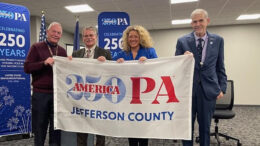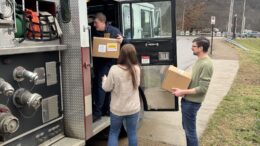Does your two-year-old have a good vocabulary? How do you know? What if they don’t?
Early intervention is a set of services and supports to families with children from birth to age three who are showing delays in their development.
Ashley Ahrens, a speech and language pathologist, is the owner of Community Rising Therapies, which provides early intervention services to families in the Oil Region.
The concept of early intervention, said independent contractor Ashley Mahrs, stems from the awareness that much of the brain’s major foundational systems are built between the ages of birth to five.
Delays in that development, Mahrs said, are easiest to mitigate the earlier they’re caught.
The term “delay” can indicate a slowed development of one or more systems that help human beings function. Delays can encompass things like speech, movement and the ability to complete tasks necessary to life.
On the speech side of things, Ahrens said concerns could arise if a child isn’t using a good repertoire of words by age two. For physical and occupational early intervention, milestones like walking and being able to follow multi-step commands are benchmarks of healthy development.
As pediatricians and schools move back to more and more in-person traditional interactions, the number of referrals for children who’ve already aged out of eligibility for early intervention services, or are about to, was affected, Ahrens said.
For physical therapist Kelly Hines, owner of Milestone Pediatric Therapy, that led to a wide range of delays that may have been missed.
“There weren’t play dates, we were social distancing, you’re not getting around other parents and their kids to see how your child is developing,” she said.
Mahrs agreed.
“In the past six months I’ve gotten a lot of referrals” for kids between two and three years old, Mahrs said. She added that by that point, it’s getting late in the day to help make the connections that are happening more slowly.
Human services, said Mahrs, will help them through the process of applying for that evaluation.
At that point, said Ahrens, an evaluator would come, most often to the house although services can occur anywhere that’s considered within the family’s “natural environment.”
Places like parks, daycare centers and grandparents’ houses are also common places for early interventionists to work with kids and their families.
Hines said it’s important to know that no two children are the same, so no two plans of care for a child receiving early intervention services are the same either.
Some kids, she said, have combinations of speech, physical and occupational issues that get dealt with. She said her area of expertise — physical therapy — often overlaps with occupational therapy and vice versa.
What she loves about the work she does, Hines said, is seeing kids make progress on goals identified through the course of services, and seeing parents feeling empowered to help their children succeed.
“We’re not just there for the child,” said Hines. “We’re there in a coaching capacity, we work with the family, we work with the parents to help them learn what to do.”
Much of the time, said Hines, she’ll arrive at the home of a family she’s working with to find parents excited to show her how they used what she’d shown them to help their kids make progress all week.
“Some even go beyond what I show them,” she said, using skills in other areas where they see a need for development.
“Their confidence increases,” said Hines, “and they take more of a leadership role” in the whole situation.
People can contact their county Department of Human Services to find out about the early intervention services available in their area.



































